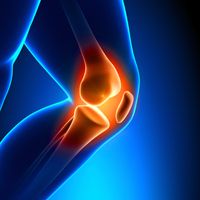Article
Knee Replacement Outcomes in Rheumatoid Arthritis vs. Osteoarthritis
Author(s):
When severe joint damage is present, total knee arthroplasty (TKA) surgery may be the best approach to regain comfort and function. Researchers analyzed procedure outcomes in two groups of patients.

When severe joint damage is present, total knee arthroplasty (TKA) surgery may be the best approach to regain comfort and function. Researchers analyzed procedure outcomes in two groups of patients.
More than 600,000 TKA surgeries are performed every year in the US, according to a report by the Agency for Healthcare Research and Quality. Many of the patients suffer from degenerative diseases such as rheumatoid arthritis (RA) and osteoarthritis (OA). While about 90% of patients experience significant pain relief as a result of the procedure, the American Academy of Orthopedic Surgeons determined, better outcomes may be associated with one type of arthritis over another.
The analysis included 18,897 patients — 834 (5.4%) with RA and 315 (10.2%) with OA. The participants’ average ages were 65 and 68, respectively, and the TKAs took place from 1999 to 2012. Pain and Health-Related Quality of Life (HRQoL) levels were measured before surgery as well as three and six months afterwards.
“TKA serves as a ‘time machine’ via which patients can return to a less disabled lifestyle, before the arthritis process catches up,” the Arthritis & Rheumatology report said.
Following the procedures, both groups showed substantial improvements when it came to pain levels and function. However, patients with OA showed to have an even better response to TKA, based on standard response mean (SRM) scores for knee pain between baseline and recovery. Patients with RA went from an SRM of -1.33 to -1.75 while those with OA made a greater jump from -1.34 to -1.94.
“TKA is highly effective in reducing clinically relevant knee pain to a great extent than other subjective HRQoL indices in patients with RA, although this improvement is less marked as compared to OA patients,” the study concluded.





